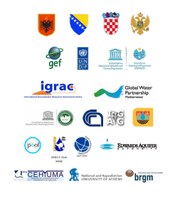The Project at a glance
Project Title: Protection and Sustainable Use of the Dinaric Karst Aquifer System search
Project Description
The DIKTAS project (Protection and Sustainable Use of the Dinaric Karst Transboundary Aquifer System), is the first ever attempted globally to introduce sustainable integrated management principles in a transboundary karst freshwater aquifer of the magnitude of the Dinaric Karst System. At the global level the project aims at focusing the attention of the international community on the huge but vulnerable water resources contained in karst aquifers (carbonatic rock formations), which are widespread globally, but poorly understood. The Dinaric Karst Aquifer System, shared by several countries and one of the world’s largest, has been identified as an ideal opportunity for applying new and integrated management approaches to these unique freshwater resources and ecosystems.
Project objectives
At the regional level the project’s objectives are to:
- Facilitate the equitable and sustainable utilization and management of the transboundary water resources of the Dinaric Karst Aquifer System, and
- Protect from natural and man-made hazards, including climate change, the unique groundwater dependent ecosystems that characterize the Dinaric Karst region of the Balkan Peninsula.
These objectives, which aim to contribute to sustainable development of the region, are achieved through a concerted multi-country effort involving improvement in scientific understanding, the building of political consensus around key reforms and new policies, the enhanced coordination among countries, donors, projects and agencies, and the consolidation of national and international support.
Project Outcomes/outputs
The Project produces a better knowledge of the source and consensus on the causes of its degradation (TDA), a consultation mechanism among the countries sharing the aquifer, formal agreement on corrective actions including policy, legal and institutional reforms, and investments, to be taken jointly (SAP), and improved awareness and sustained international support. Results are measured in terms of the achievement of key benchmarks (establishment of national inter-ministry committees, approval of TDA, endorsement of SAP, establishment of a joint permanent consultation mechanism).
Project Results
The project results include the following:
- A Transboundary Diagnostic Analysis developed;
- Baseline conditions identified, and environmental status indicators agreed upon and adopted;
- A multi-country consultative body established and operational;
- Through SAP process, water resources and environmental quality targets adopted and a joint harmonized monitoring program of the environmental status established;
- A mechanism for coordination and exchanges with other relevant projects and initiatives, including the GEF supported Mediterranean Partnership and others, established and operational;
- Countries establish ad hoc inter-ministerial committees focused on harmonization of existing frameworks, and on priority reforms;
- A partnership conference consolidates international support for the implementation of the priority actions;
- Regional SAP (and NAPs) adopted at high level;
- Selected media events to highlight project’s progress and achievements;
- Targeted capacity building programs to encourage replication of new practices, behaviours and technique;
- Participation to IW LEARN activities, and establishment of website.


